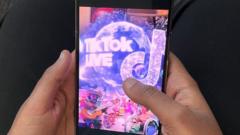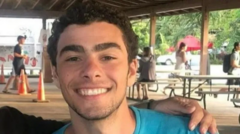Zara, a young woman of Somali descent in the US, reveals her obsession with TikTok battles that led her to spend her university savings. This article explores the financial and psychological toll of these battles, along with the underlying cultural tensions they exacerbate within the Somali community.
The Price of Fame: Somali TikTok Battles and their Dark Underbelly

The Price of Fame: Somali TikTok Battles and their Dark Underbelly
A look into the world of Somali TikTok battles that captivates thousands but also reveals darker truths about online interactions and cultural tensions.
Scrolling through Zara’s transactions reveals a startling truth; she has devoted thousands of dollars to TikTok, drawn into the platform's unique live battle feature. Known informally as the Big Tribal Game, these contests involve two influencers, often representing opposing Somali clans, engaging in verbal sparring while soliciting monetary support from viewers. With Somali roots, Zara became addicted to these online battles, motivated by a desire to defend her clan's honor.
However, the innocent allure of entertainment soon morphed into a concerning obsession. Zara divulged that her cumulative spending exceeded $7,000, amounting to her university fees. "My parents, if they found out, they would be devastated," she admitted, acknowledging an addiction to the platform. Her experience soon took a darker turn when an influencer—Hussein Kibray—began threatening her with manipulated images, leading to sleepless nights filled with anxiety over her privacy.
The battles create a charged atmosphere where clannism resurfaces, as exaggerated claims and insults about previous civil conflicts are hurled online. While they entertain thousands, raising billions in ‘gifts’ and payments, the implications of these interactions raise eyebrows among observers. Many are concerned that they foster a toxic online environment, limiting genuine community healing from past atrocities. With influences emanating from the diaspora, there is an entropy of cultural fragmentation, pitting individuals against each other over past grievances.
Prominent Somali influencer Bilaal Bulshawi, who has nearly two million followers, voiced concern over the societal implications of participating in these matches. He described the bizarre phenomenon where even politicians in Somalia humorously debate clan victories from these virtual contests. Instead of harnessing community resources towards progress and recovery, the accumulation of virtual riches raises ethical questions.
Experts believe those familiar with TikTok's intricate functions suggest that the significant revenue influencers generate may not flow entirely into their pockets but are influenced by platform fees, managerial cuts, and superficial valuations of virtual gifts. Crystal Abidin, a professor of internet studies, noted, “the volume or the breakdown in percentage is actually quite opaque.”
Thus, Zara’s predicament is reflective of broader issues surrounding social media’s impact, especially among the Somali diaspora. It highlights a need for discussions around the ramifications of clannism, addiction to virtual validation, and the significant generational sacrifices made for fleeting digital fame. The Big Tribal Game emphasizes the necessity for dialogue about community resilience amid historical tensions, revealing the duality of online entertainment as both a cultural expression and a source of unrest.




















